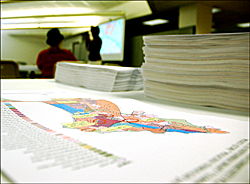Zoning is the set of rules that govern how land may be used and the development standards for all property within Nashville. Zoning is necessary to protect the community health, safety, and welfare.
The Zoning Code details land development restrictions that control the types of buildings allowed on a property such as how tall they can be, how far they are set back from the street, and other development standards.
The basic Zoning Classifications are
- Agricultural
- Residential
- Institutional
- Mixed use
- Office
- Commercial
- Shopping center
- Industrial
- Specific Plan (SP) Districts
The Land Use Table outlines how land can be used. Your site is considered "zoned and ready" if its current zoning matches your intended use; the next step in that case is to apply for a building permit at the Department of Codes and Building Safety.
Overlays
In addition to base zoning, some areas have overlays that work in cooperation with or in addition to the zoning code.
.jpg)
Application and Fees
To submit an application, you first need an account on the planning portal. See instructions on how to create a portal account. Paper applications are not accepted at the Planning Front Counter. All applications must be submitted through the portal.
Please note that the deadlines listed in the submittal schedule are for fee payments. All documents must be in the portal by noon 24 hours prior to the fee deadline. Documents will not be processed on the fee deadline itself.
Fees are due by noon on the deadline date and may be paid either by check at the front counter or by phone using a credit card (2.3 percent).
Questions for Planning
Please complete the pre-application form and send to planningstaff@nashville.gov. A planner will typically respond to you via email within a week. If your project is more complex, the assigned planner may present your inquiry at an internal planning meeting to provide more comprehensive feedback. Should the planner determine that your project requires this review, it may take additional time to receive feedback.
Please be as thorough as possible when filling out the form. All inquiries should include a graphic representation of your project, except for questions related to rezoning to an established zone. A planner will respond to you via email.
Pre-Application Inquiry Form (Spanish)
Zone Change Application: $2,050
A change in a property’s zoning classification
Zoning Text Amendment: $4,000
A text amendment prepared by staff in response to an application submitted proposing changes in the zoning code.
Zoning Letters
The Planning Department only provides zoning letters for the following: Planned Unit Developments, Specific Plan Districts, and Urban Design Overlays. Please email planningstaff@nashville.gov with the address, parcel number, and primary contact email. You may pay by check or credit card (with additional fee).
Zone Changes

Property owners can file a rezoning application if their property is not zoned for their intended use or development. The Planning Department coordinates the application with all other applicable Metro Departments. For all zone changes, the Planning Commission makes recommendations to the Metropolitan Council, which makes the final decision on all zone changes.
Community members can provide input on the underlying land use policies during the community planning process. Both the Planning Commission and the Metropolitan Council hold public hearings on individual zone changes.
Before a Zone Change
Before a zone change, we encourage applicants to consider the following:
- Talk to the Council member(s) and neighbors. Council members often host meetings with neighbors who would be impacted by potential zone changes.
- Review the area’s Community Plan to make sure the zone change fits the community’s vision for land use policy.
- If you have questions about a proposed use is classified by the zoning ordinance, contact the Zoning Examiner
- Check if there are additional development guidelines in the area, such as:
- Redevelopment District managed by Metropolitan Housing and Development Agency (MDHA)
- Historic District, managed by Metro Historic Zoning Commission
- Planned Unit Development (PUD)
- Overlays
- Local Planning Studies
- Supplemental Policy
Finally, let the Councilmember(s) and the Metropolitan Council Office Planning and Codes Liaison know about your application.
Zone Change Process

The zone change process takes 3-6 months if there are no complications. Metro Ordinances include details on approved zone changes.
Step 1- Application
After reviewing the application checklist and Planning Commission Meeting Information, the applicant submits the appropriate application and fee to the Planning Department.
Step 2 - Staff Review
Planning staff reviews the application to ensure that it follows land use policy in the Community Plan and any additional development guidelines. Other Metro departments and utility districts review the application.
Step 3 – Public Notices
The applicant must post signs on the property stating the zone change and the date of the Planning Commission public hearing. The applicant must also mail notices to nearby property owners.
Step 4 - Recommendation to the Planning Commission
Planning staff posts a draft agenda the Friday before each Planning Commission meeting that includes the staff recommendation - approval, disapproval, or approval under certain conditions. The Staff Report details the staff recommendation.
Step 5 - Planning Commission recommendation to Metro Council
The Planning Commission considers the application at a scheduled regular meeting, which provides an opportunity for public comment at the public hearing. The Commission then makes a recommendation to the Metropolitan Council.
Step 6 - Metropolitan Council Action
The Metropolitan Council considers the application as a Bill through three "readings" before an approval can be made final.
- 1st reading - Introduction
- 2nd reading - Public Hearing
- 3rd reading - Action
The Council can override the Planning Commission's recommendation during this process.
Step 7 - Mayor signs the Bill
Finally, the Mayor approves or vetoes the application.
